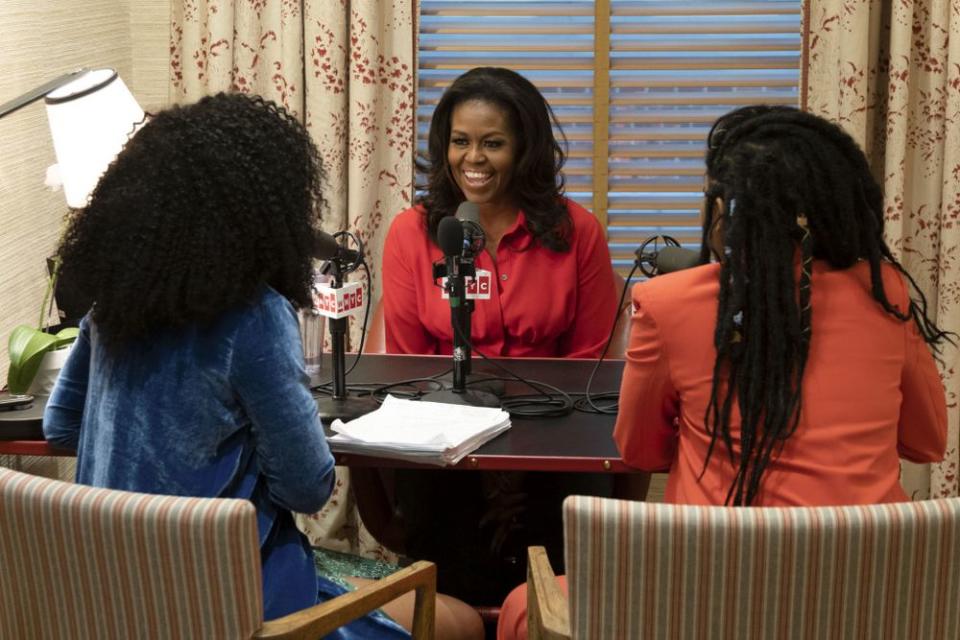Michelle Obama Talks Raising Her Daughters to Use Their Voices: I Want Them to 'Practice Boldness'
Michelle Obama has a bold vision for her daughters’ futures, but she’s not ready to dish it out all at once.
In the final episode of WNYC Studios’ popular podcast 2 Dope Queens, hosted by Phoebe Robinson and Jessica Williams, the former first lady gets candid in an interview about how she deals with the “angry black woman stereotype” and how she’s teaching her daughters to speak up and advocate for themselves in a society that has long stifled the voices of women and minorities.
“With them, my philosophy is we’ll talk about things when you need it,” Mrs. Obama, 54, says of preparing daughters Malia, 20, and Sasha, 17, for some of the challenges they may face as they get older. But, she admits, her strategy doesn’t always work. “In my mind, I think that I wait for them to approach me with the issue,” she says, but she’s not so sure her daughters would agree. “They will say, no, there are many times there’s a mom lecture about ‘Let me make a point.’ “

Mrs. Obama says she encourages her daughters to talk to her about anything and everything, because she’d rather have them seek advice from her than from their peers.
“I have the answers, so if you wanna know about it, come to somebody where you get the right information,” she explains. “I told them this when they were younger: Do not get your information from another 12-year-old. All of you are stupid. Love you, love your friends, but when you’re 12 you don’t know anything.”

While she commends younger generations for their ability to speak openly about subjects that were considered taboo in the past — everything from marriage to miscarriages to menopause — she encourages them “to find the people in their lives, the elders, the women who have been through it, and get some facts” in addition to sharing with their peers.
And it’s not a one-way street between the younger and older generations, she reminds listeners. “If I’m not sharing with them, they won’t share with me… we gotta give up the information. We can’t be so embarrassed or so pained that we can’t educate.”
Mrs. Obama delves deep into many of her private and painful experiences in her new memoir, Becoming, in hopes of normalizing conversations around issues that sometimes weren’t discussed in her generation and left her feeling isolated. In a clip from Becoming Michelle: A First Lady’s Journey with Robin Roberts, which expands on her memoir, she recalls the miscarriage she suffered nearly 20 years ago, admitting, “I felt lost and alone and I felt like I failed.”

Reflecting on it now, the Chicago native says she wished she knew other women had experienced miscarriages as well — a lesson that would have helped lift the shame she associated with it.
“I felt like I failed because I didn’t know how common miscarriages were because we don’t talk about them,” Mrs. Obama explains in the ABC interview. “We sit in our own pain, thinking that somehow we’re broken.”
In addition to discussing her private struggles in the memoir, Mrs. Obama also gives insight into the effort it takes to maintain her public image while making her voice heard.
“I have to be aware of what I say and how I say it because if you want to get a point across… if you’re a woman and you’re too angry people stop hearing the point. They don’t hear you,” she says in the podcast. “There’s a lot of anger being expressed these days and I just think man if I ever said that, those would be those bubble moments where I could end the presidency.”

In order to be heard, she shares, she’s learned to separate her anger from the goal, and mentors young people to do the same. “It’s like have the feeling, don’t deny the feeling exists, I’m not gonna pretend like I’m not angry. But if I’m trying to move an issue, if my anger doesn’t work to move the issue, then it’s not helpful. And that’s what going high means. Going high means you don’t ignore it.”
And Mrs. Obama is grateful to have a partner who works the same way in order to make change happen. “Barack has been good at that, that’s his even keeled temper is not just cause he’s calm and cool and not emotional. It’s just like, you know, brother can’t get too angry if he wants to move things forward. He doesn’t have the leeway to solve problems with anger,” she says of her husband.

“And that remains true for women and minorities,” she adds. “So yeah, I still watch what I say and think about what I say because I don’t get a second chance. I don’t get the benefit of the doubt that maybe she had a bad day, or maybe she didn’t mean what she said.”
When it comes to her daughters’ voices, she’s determined to help them reach their full potential. “What my parents did was that they saw that flame in me, and they kept it lit,” she explains. “So, right now, I think I want to fan their flames… I want to get them used to maybe overstepping a little bit ’cause sometimes with women you don’t step up enough. You don’t use your voice enough because you’re told you’re mouthy or you’re bossy or be quiet or that’s not cute.”
Mrs. Obama is ready to see her bold vision for her daughters and young women everywhere put into words and action.
“So we’ve already practiced girls and stifle… I want to practice boldness, and then we can bring it back, you know?”

